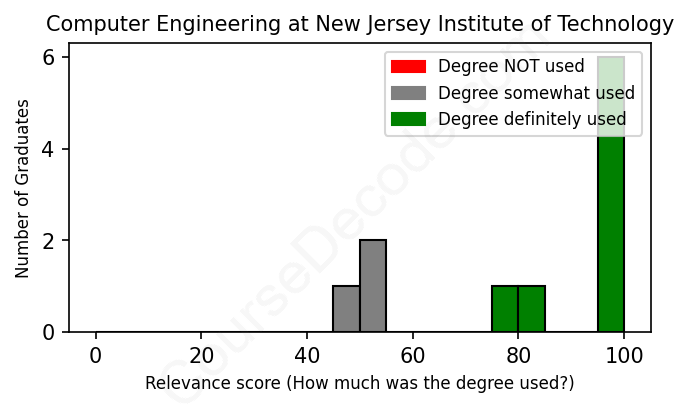
First, some facts. Of the Computer Engineering graduates from New Jersey Institute of Technology we've analyzed , here's how many have used (or NOT used) their degree in their career:

These are estimates based on AI analysis of 11 LinkedIn profiles (see below).
The verdict? Significantly above average. Overall, with an average relevance score of 81%, Computer Engineering graduates from New Jersey Institute of Technology have a much higher likelihood (+14%) of finding work in this field compared to the average graduate across all fields:
And for comparison, here's the chart for all profiles we've looked at across all degrees.
Also, after graduating, only 27% of these graduates have pursued further education other than another Bachelor's degree (such as a Masters degree or other), compared to the average across all profiles of 35%. This suggests a Bachelors degree is enough for most Computer Engineering graduates, and it's normal to look for work straight after graduation.
See the details:
|
Relevance score: 51% We think this person has gone into a career only somewhat relevant to their degree. We think this person has gone into a career only somewhat relevant to their degree.
DEGREE INFOGraduated in 2017 from New Jersey Institute of Technology with a Bachelors Degree in Computer Engineering. No other secondary education since. JOB HISTORY SINCE GRADUATIONSystem Verification Tester Intern Nokia Jun 2017 - Aug 2017 Fiber Optic Technician  Chiral Photonics Aug 2018 - Present ABOUTNo information provided. |
The top 10 most common jobs done by the graduates we've analyzed (ranked most common to least) are:
When looking at the job paths taken by graduates from the New Jersey Institute of Technology with degrees in Computer Engineering, it’s clear that a lot of them have found positions that are quite relevant to their field. Many have gone on to work at major companies like Verizon and Apple, holding titles such as Platform Engineer, Developer Analyst, and Software Integrity Engineer. These roles typically involve applying their computer engineering skills, whether it’s in developing software systems, engineering telecommunications platforms, or even conducting reliability assessments. This is a great sign because it shows that their education has a tangible connection to their professional work.
However, it's worth noting that not every job these graduates landed is directly related to the core technical skills of computer engineering. Some have taken on roles like Technician, Doctor's Assistant, or even Inventory Specialist, which don’t really apply the engineering principles they learned in school. It seems that while a significant number of these graduates are in roles that efficiently use their computer engineering background, there are still quite a few who have ventured off into positions where their degree's relevance isn't as strong. So, if you're considering this field, make sure to look for positions that truly tap into that engineering knowledge to get the most out of your education!
Here is a visual representation of the most common words in job titles for Computer Engineering graduates (this is across all Computer Engineering graduates we've analyzed, not just those who went to New Jersey Institute of Technology):

Looking at the career trajectories of graduates from the New Jersey Institute of Technology's Computer Engineering program, it's clear that many of them have found solid footing in the tech industry. For instance, those who graduated in 2010 and 2017 have steadily climbed the corporate ladder, moving through various engineering roles and taking on increasing responsibility over the years. This showcases a common trend where early-career positions, such as technician or web developer, often lead to more advanced roles, like engineers or specialists, within well-known companies like Verizon and Apple. One can infer that the education and skills gained at NJIT have positioned these individuals well in the tech landscape, allowing for relatively smooth transitions from entry-level jobs to significant engineering positions within just a few years post-graduation.
However, not everyone's path aligns perfectly with their degree. Some graduates, like those from 2017, have had a mixed bag of jobs that don't completely leverage their engineering background—like working as a doctor's assistant or in inventory. While it seems like many graduates do end up in relevant tech roles over the long term, the presence of unrelated career choices suggests that the job market can be unpredictable. But overall, the longer-term career patterns indicate a strong trend towards stable, relevant careers in engineering, especially for those who graduated more recently. Many of these graduates are well on their way to building successful careers in diverse and high-demand sectors of technology, showing that a degree from NJIT can open some pretty solid doors in the tech world.
Getting a Bachelor’s degree in Computer Engineering at NJIT can be pretty challenging, but it's definitely manageable if you stay on top of your studies. You’ll dive into some intense math and physics courses, alongside programming and hardware design classes that require a good amount of problem-solving skills. While some students find it a bit tough due to the heavy workload and technical concepts, others who are dedicated and passionate about the field often find it rewarding and engaging. It's kind of on par with other engineering degrees—not too easy, but if you put in the effort and seek help when you need it, you can totally succeed!
Most commonly, in the LinkedIn profiles we've looked at, it takes people 4 years to finish a Bachelor degree in Computer Engineering.
Looking at these Computer Engineering graduates from NJIT, it seems like most of them have landed some pretty solid jobs, especially those who graduated a bit earlier. For example, the person who gradually moved up from Technician to Distinguished Engineer at Verizon likely raked in some nice paychecks, especially at those higher roles. Those working at big companies like Apple and the Department of Defense (NAVAIR) are usually well-compensated too, since tech roles in those places typically pay well. However, newer grads like the ones just starting out might not be making bank right away, especially if they're in entry-level roles. Overall, it seems like a good number of them could be making decent money, especially as they gain more experience!
Here is a visual representation of the most common words seen in the "about" section of LinkedIn profiles who have a Bachelor degree in Computer Engineering (this is across all Computer Engineering graduates we've analyzed, not just those who went to New Jersey Institute of Technology). This may or may not be useful:

Here are all colleges offering a Bachelor degree in Computer Engineering (ordered by the average relevance score of their Computer Engineering graduates, best to worst) where we have analyzed at least 10 of their graduates:
| College | Score | Count |
|---|---|---|
 University of Florida University of Florida
|
95 | 18 |
 Michigan State University Michigan State University
|
94 | 10 |
 Brigham Young University Brigham Young University
|
94 | 10 |
 Penn State University Penn State University
|
92 | 14 |
 California Polytechnic State University-San Luis Obispo California Polytechnic State University-San Luis Obispo
|
91 | 14 |
 University of Central Florida University of Central Florida
|
90 | 14 |
 Georgia Institute of Technology Georgia Institute of Technology
|
90 | 14 |
 Purdue University Purdue University
|
86 | 34 |
 University of Illinois at Urbana-Champaign University of Illinois at Urbana-Champaign
|
86 | 30 |
 Iowa State University Iowa State University
|
86 | 25 |
 Texas A&M University Texas A&M University
|
85 | 17 |
 San Jose State University San Jose State University
|
85 | 16 |
 Clemson University Clemson University
|
85 | 14 |
 Dwarkadas J. Sanghvi College of Engineering Dwarkadas J. Sanghvi College of Engineering
|
85 | 10 |
 North Dakota State University North Dakota State University
|
84 | 12 |
 Savitribai Phule Pune University Savitribai Phule Pune University
|
83 | 25 |
 University of Mumbai University of Mumbai
|
82 | 43 |
 New Jersey Institute of Technology New Jersey Institute of Technology
|
81 | 11 |
 University of North Carolina at Charlotte University of North Carolina at Charlotte
|
79 | 11 |
 California State Polytechnic University-Pomona California State Polytechnic University-Pomona
|
76 | 11 |
 The University of Texas at Dallas The University of Texas at Dallas
|
76 | 18 |
 University of South Florida University of South Florida
|
69 | 10 |
 Gujarat Technological University, Ahmedbabd Gujarat Technological University, Ahmedbabd
|
55 | 13 |